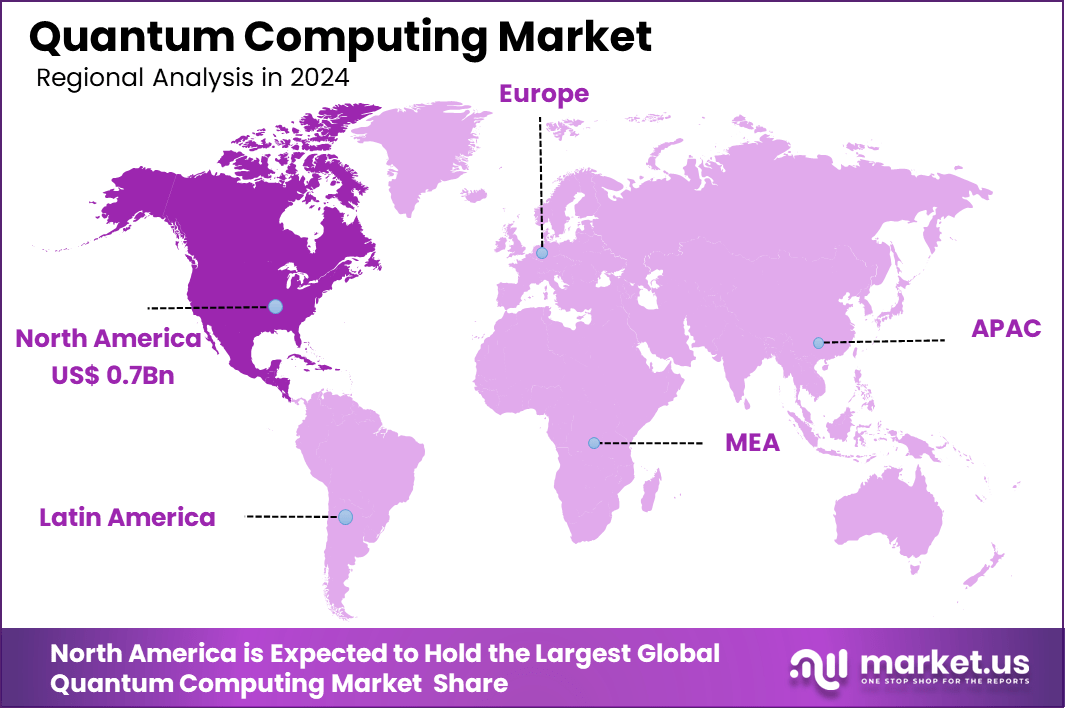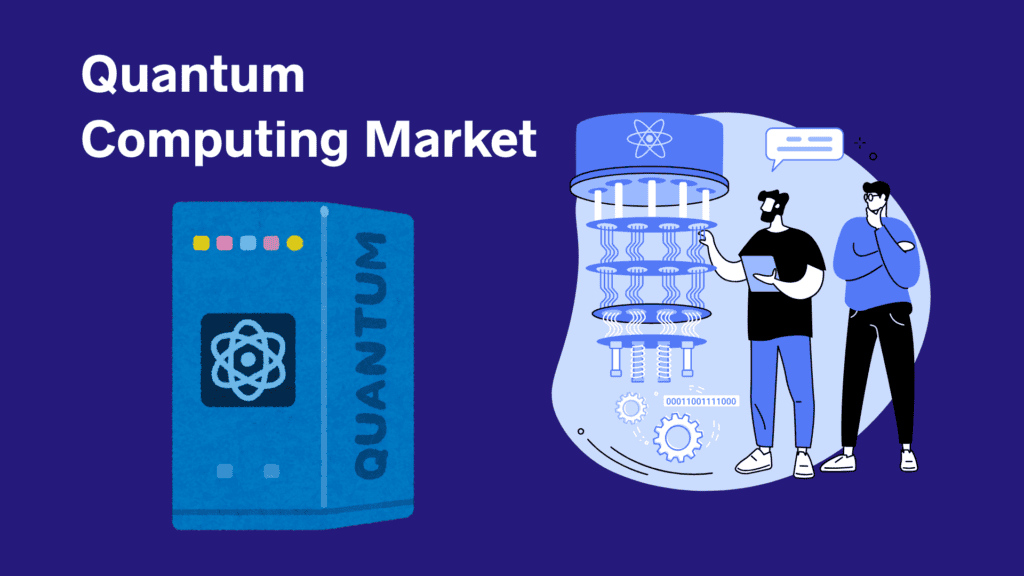Introduction
The global Quantum Computing Market was valued at USD 2.1 billion in 2024 and is projected to reach about USD 20.5 billion by 2034, expanding at a strong CAGR of 25.6% during 2024–2033. This growth is being driven by rising investments in advanced computing technologies, expanding applications in cryptography and materials science, and growing enterprise adoption for optimization and simulation tasks.
The Quantum Computing Market refers to the development, commercialization, and application of computing systems based on the principles of quantum mechanics. Unlike classical computers that process information in binary bits, quantum computers use quantum bits, or qubits, which can exist in multiple states simultaneously. This allows for the performance of complex calculations at speeds that are not achievable with traditional systems.
The market includes quantum hardware, software platforms, quantum cloud services, and algorithm development tools. Key applications are found in sectors such as pharmaceuticals, materials science, finance, defense, and artificial intelligence. The market is being driven by the need for high-performance computing solutions to address problems that exceed the limits of classical systems. Industries dealing with complex simulations, large-scale optimization, and advanced cryptography are leading demand for quantum solutions.
Growing investments from government bodies, academic institutions, and private companies are accelerating research and development. Strategic partnerships between technology firms and enterprises are supporting use-case validation and early commercialization. Additionally, the urgency to stay ahead in cybersecurity and secure communication is influencing the pace of adoption in sensitive sectors.

According to a report by PwC, startups represent about 40% of the players in the quantum computing market, while 33% are academic institutions. This indicates that the industry is being shaped by a mix of agile innovators and research-driven organizations, creating a dynamic ecosystem that accelerates breakthroughs and practical applications.
Quantum computing is expected to transform multiple industries, with finance leading adoption at 28%, leveraging quantum algorithms for risk analysis, fraud detection, and portfolio optimization. The energy and materials sector follows with 16%, reflecting potential use cases in improving energy efficiency and advancing material sciences. Advanced technology industries are also positioned to benefit significantly as applications mature.
D-Wave stands out as the most funded private company, securing USD 216 million across 19 funding rounds, according to Crunchbase. Its D-Wave 2000Q quantum computer operates at an ultra-low temperature of 0.015 Kelvin, a requirement for maintaining quantum coherence and boosting performance. Furthermore, the application of quantum tunneling is projected to reduce power consumption by 100 to 1000 times, signaling a major leap in computational efficiency and sustainability.
Key Takeaways
- The market is projected to grow from USD 2.1 Billion in 2024 to nearly USD 20.5 Billion by 2033, at a strong 25.6% CAGR.
- In 2024, North America led with 37.6% share, valued at about USD 0.7 Billion.
- The U.S. market is forecast to expand from USD 0.8 Billion in 2025 to USD 5.5 Billion by 2034, at a 23.5% CAGR.
- By offering, System-based solutions dominated with 64.6% share, reflecting hardware-driven growth.
- By deployment, the On-Premises segment held 60.2% share, showing demand for secure, locally managed systems.
- By application, Optimization led with 40.5% share, widely used in logistics, finance, and supply chains.
- By end-user, Aerospace & Defense was the top sector, contributing 32.6% share, supported by national security investments.
Regional Analysis
In 2024, North America held a dominant market share of 37.6%, generating around USD 0.7 billion in revenue. The region’s leadership is supported by heavy research funding, strong government initiatives, and the presence of major technology firms and research institutions that are accelerating innovation and commercialization of quantum technologies.

Driver Analysis
Rising Adoption in Banking and Finance
Quantum computing is gaining significant adoption in the banking and finance sector due to its ability to handle complex computations that classical computers struggle with. This technology helps optimize portfolio management, enhance risk analysis, accelerate financial simulations, and improve fraud detection. As financial institutions face increasing demands for speed and accuracy in processing large datasets, quantum computing offers a promising solution.
This adoption is fueling market growth by driving demand for quantum computing services and encouraging investment in related technologies. The banking sector’s focus on leveraging advanced computational power positions it as a major driver of the quantum computing market. The move toward cloud-based quantum computing platforms is further facilitating adoption by financial firms. These platforms allow organizations to access quantum resources without large upfront costs for hardware, lowering barriers to entry.
Combined with growing investments from private companies and government initiatives supporting research, the financial industry’s interest in quantum computing significantly accelerates market expansion. This sector’s need for innovation in computational power remains a strong force behind quantum computing development and commercialization.
Restraint Analysis
High Error Rates and Qubit Stability Issues
A major restraint slowing quantum computing market growth is the technical challenge of maintaining qubit stability and managing high error rates. Qubits are vulnerable to interference from heat, electromagnetic noise, and other environmental factors. This causes quantum decoherence, where qubits lose their information, resulting in errors during calculations.
Currently, quantum error correction requires many physical qubits to form a single reliable unit, making hardware complex and resource-intensive. These limitations make it difficult to build large-scale, stable quantum computers, which slows commercialization efforts and limits practical deployment.
Moreover, the infrastructure needs for quantum systems, such as cryogenic cooling and sophisticated hardware, add to the operational costs. This increases the initial investment required and restricts access mainly to well-funded organizations and governments. Until quantum error correction methods improve and hardware scalability is achieved, the market will face challenges in expanding use cases and attracting broader adoption. This technical barrier remains a significant hurdle on the path to mainstream quantum computing application.
Opportunity Analysis
Accelerated Drug Discovery and Pharmaceutical Research
Quantum computing presents a significant opportunity in the pharmaceutical industry, particularly in drug discovery and development processes. Traditional drug development is costly, time-consuming, and has a low success rate. Quantum computing can simulate complex molecular interactions more precisely and quickly than classical computers, potentially accelerating the design and optimization of new drugs.
This capability could save pharmaceutical companies years and millions of dollars by improving early-stage research and reducing trial-and-error experimentation. The use of quantum simulations to understand biological systems and drug interactions enables more targeted and effective medicines.
The healthcare sector’s growing investment in computational tools to enhance research efficiency makes quantum computing a critical technology for future breakthroughs. As more companies adopt quantum resources through cloud services, the pharmaceutical industry’s demand for quantum solutions is expected to rise, creating substantial market growth potential.
Challenge Analysis
Lack of Skilled Workforce
A key challenge in the quantum computing market is the shortage of skilled professionals trained in quantum technologies. Quantum computing relies on fundamentally different principles than classical computing, requiring expertise in quantum physics, quantum algorithms, and hardware development. Currently, the global supply of quantum experts is far lower than the expected demand.
Skills gaps hinder enterprises from deploying and managing quantum computing solutions effectively, limiting market growth. Without sufficient talent, companies struggle to innovate and adopt quantum technologies broadly. This workforce deficit is exacerbated by the nascent state of the technology, with educational programs and training still catching up to industry needs.
The complexity of programming and maintaining quantum computers makes onboarding new users slower. To overcome this barrier, increased efforts in education, training, and workforce development are needed. Until then, talent scarcity poses a persistent market challenge that affects the pace at which quantum computing solutions can be commercialized and scaled.
Key Market Segments
By Offering
- System
- Services
By Deployment
- On-Premises
- Cloud
By Application
- Optimization
- Simulation
- Machine Learning
- Others
By End-user
- Aerospace & Defense
- BFSI
- Healthcare
- Automotive
- Energy & Power
- Chemical
- Government
- Others
Most prominent quantum computing industry players
- IBM Corporation
- Google Quantum AI
- Microsoft Corporation
- Amazon Web Services, Inc
- Atos Quantum
- D-Wave Quantum Inc.
- Intel
- Hitachi
- QC Ware
- Zapata Computing
- Toshiba Corporation
- Other Key Players
Discover More – https://market.us/report/quantum-computing-market/












